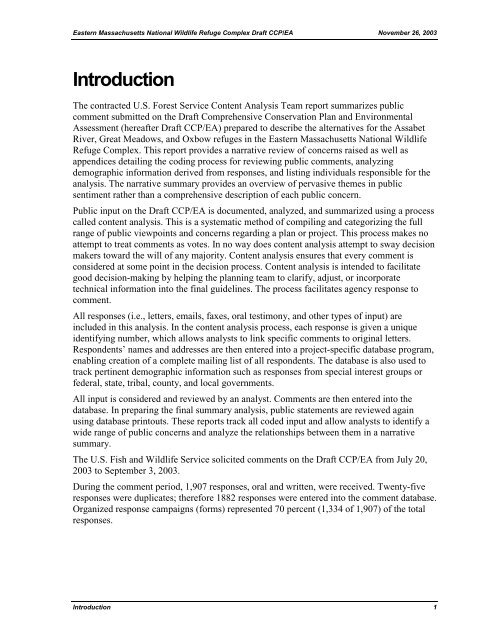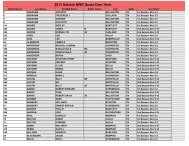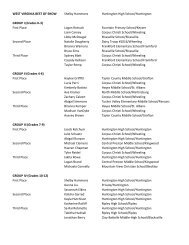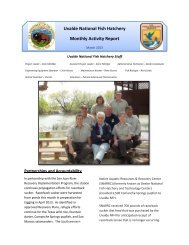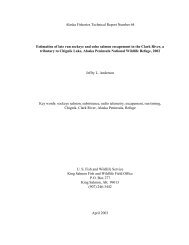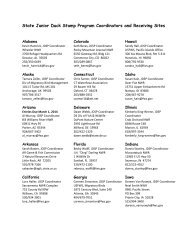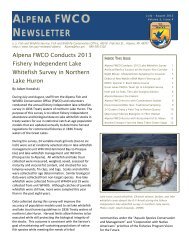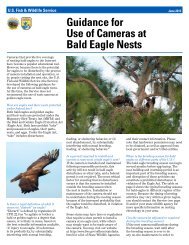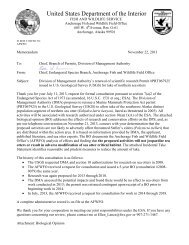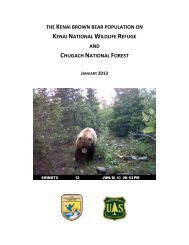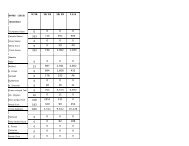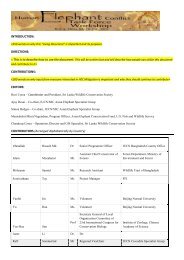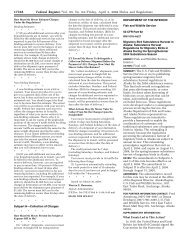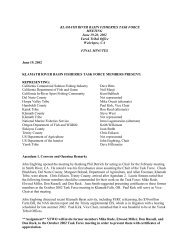Assabet River NWR Final CCP - U.S. Fish and Wildlife Service
Assabet River NWR Final CCP - U.S. Fish and Wildlife Service
Assabet River NWR Final CCP - U.S. Fish and Wildlife Service
You also want an ePaper? Increase the reach of your titles
YUMPU automatically turns print PDFs into web optimized ePapers that Google loves.
Eastern Massachusetts National <strong>Wildlife</strong> Refuge Complex Draft <strong>CCP</strong>/EA November 26, 2003<br />
Introduction<br />
The contracted U.S. Forest <strong>Service</strong> Content Analysis Team report summarizes public<br />
comment submitted on the Draft Comprehensive Conservation Plan <strong>and</strong> Environmental<br />
Assessment (hereafter Draft <strong>CCP</strong>/EA) prepared to describe the alternatives for the <strong>Assabet</strong><br />
<strong>River</strong>, Great Meadows, <strong>and</strong> Oxbow refuges in the Eastern Massachusetts National <strong>Wildlife</strong><br />
Refuge Complex. This report provides a narrative review of concerns raised as well as<br />
appendices detailing the coding process for reviewing public comments, analyzing<br />
demographic information derived from responses, <strong>and</strong> listing individuals responsible for the<br />
analysis. The narrative summary provides an overview of pervasive themes in public<br />
sentiment rather than a comprehensive description of each public concern.<br />
Public input on the Draft <strong>CCP</strong>/EA is documented, analyzed, <strong>and</strong> summarized using a process<br />
called content analysis. This is a systematic method of compiling <strong>and</strong> categorizing the full<br />
range of public viewpoints <strong>and</strong> concerns regarding a plan or project. This process makes no<br />
attempt to treat comments as votes. In no way does content analysis attempt to sway decision<br />
makers toward the will of any majority. Content analysis ensures that every comment is<br />
considered at some point in the decision process. Content analysis is intended to facilitate<br />
good decision-making by helping the planning team to clarify, adjust, or incorporate<br />
technical information into the final guidelines. The process facilitates agency response to<br />
comment.<br />
All responses (i.e., letters, emails, faxes, oral testimony, <strong>and</strong> other types of input) are<br />
included in this analysis. In the content analysis process, each response is given a unique<br />
identifying number, which allows analysts to link specific comments to original letters.<br />
Respondents’ names <strong>and</strong> addresses are then entered into a project-specific database program,<br />
enabling creation of a complete mailing list of all respondents. The database is also used to<br />
track pertinent demographic information such as responses from special interest groups or<br />
federal, state, tribal, county, <strong>and</strong> local governments.<br />
All input is considered <strong>and</strong> reviewed by an analyst. Comments are then entered into the<br />
database. In preparing the final summary analysis, public statements are reviewed again<br />
using database printouts. These reports track all coded input <strong>and</strong> allow analysts to identify a<br />
wide range of public concerns <strong>and</strong> analyze the relationships between them in a narrative<br />
summary.<br />
The U.S. <strong>Fish</strong> <strong>and</strong> <strong>Wildlife</strong> <strong>Service</strong> solicited comments on the Draft <strong>CCP</strong>/EA from July 20,<br />
2003 to September 3, 2003.<br />
During the comment period, 1,907 responses, oral <strong>and</strong> written, were received. Twenty-five<br />
responses were duplicates; therefore 1882 responses were entered into the comment database.<br />
Organized response campaigns (forms) represented 70 percent (1,334 of 1,907) of the total<br />
responses.<br />
Introduction 1


